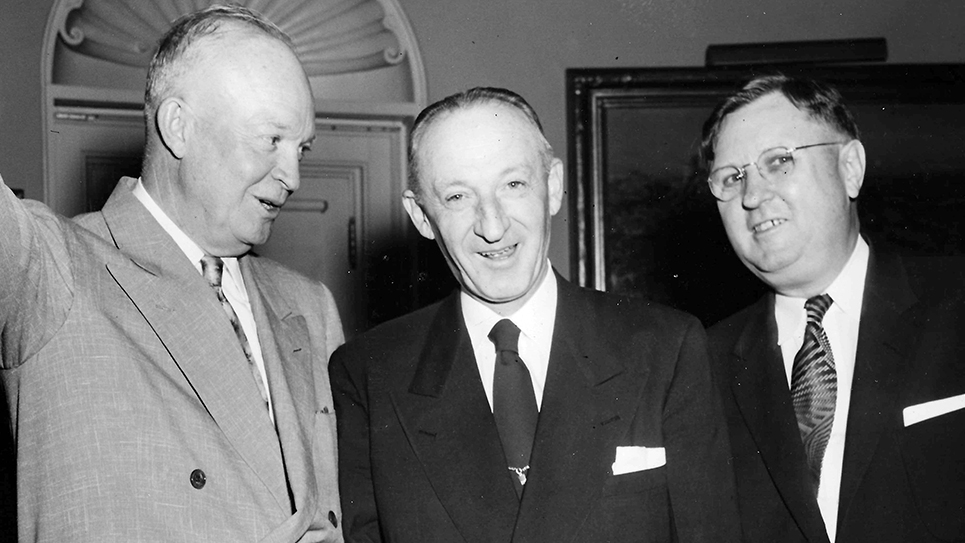Frank A. Barrett of Wyoming
By Ray Hill
There was a time when Wyoming was not such a rock-ribbed Republican state. Like much of the rest of the country, with the advent of Franklin Roosevelt and the New Deal, Wyoming elected its share of Democrats to statewide office. Because Wyoming has such a small population, the lone congressman from the Cowboy State is elected statewide. Few people have ever been elected by the people of Wyoming to represent them in the House of Representatives, as governor and United States senator. Frank A. Barrett is one of those who was elected by the people of his state to serve in the three highest offices within the gift of the voters.
Short, chunky and bespectacled, Frank A. Barrett was an attorney by profession and made his way up Wyoming’s political ladder for 36 years. A resident of Lusk in Wyoming’s Niobrara County, Barrett’s first political office was his election as county attorney in 1922. Serving a stint in Wyoming’s state Senate, Barrett easily won the 1936 GOP primary for congressman at-large. It was a terrible year for GOP candidates across the country as President Roosevelt was enormously popular and carried every state in the union save for Vermont and Maine. Frank Barrett lost to incumbent congressman Paul Greever. Two years later, Greever lost his own reelection bid to Republican Frank Horton. In 1940, the political pendulum, with FDR at the top of the Democratic ticket, swung back and Congressman Horton lost to Democrat John McIntyre. That presented yet another opportunity for Frank Barrett to make another bid for Congress in 1942.
Barrett had to face four opponents for the right to win the Republican nomination to contest the general election with Congressman John McIntyre. Barrett edged past former Congressman Charles Winter to become the Republican nominee. Barrett was fortunate inasmuch as 1942 was a good year for the GOP. The Second World War was not going well for the Allies as the Germans and Japanese seemed to be victorious time and again. Americans were restive and in a light turnout, gave the Republicans significant gains in both the House of Representatives and the United States Senate. It was enough to help Frank Barrett squeak past John J. McIntyre by 1,073 votes.
States with small populations are different as they expect to see and meet their officeholders and Wyoming was certainly no exception. Frank Barrett had the knack of making friends wherever he went, and he used his incumbency to help entrench himself as the Cowboy State’s lone congressman. Barrett was easily reelected in 1944 and again in 1946 when former Congressman John McIntyre sought a rematch. Congressman Barrett carried all but three of Wyoming’s 23 counties that year. Barrett had a close call in 1948 as Harry Truman carried the Cowboy State and GOP U.S. Senator Edward V. Robertson was losing decisively to Governor Lester Hunt.
In 1950, Frank A. Barrett announced he was running for governor. The popular congressman faced no serious challenge inside the Republican primary and faced John McIntyre in the general election. Barrett won easily, once again carrying 20 of Wyoming’s 23 counties. Even then, John McIntyre only carried one of the three by five votes.
Republicans in and outside Wyoming pressured Governor Barrett for the next two years to challenge Senator Joseph O’Mahoney in 1952. Barrett was the logical choice to run against O’Mahoney, who was a veteran of 19 years of service in the U.S. Senate. Barrett made his announcement in April of 1952, saying he intended “to wage an aggressive campaign for United States senator.” It was a contest between two well-liked and experienced officeholders. Barrett edged out O’Mahoney by more than 4,000 ballots to win a six-year term in the U.S. Senate.
Like his colleague in the Senate, Lester Hunt, Barrett had another two years on his term as governor; both men had resigned to take their seats in the U.S. Senate. Barrett worked hard at his job and did all he could to help Wyoming businesses and industries. Barrett’s term in the Senate was marred by the failing health of his wife, Alice, who was suffering from cancer. A photo taken of Senator and Mrs. Barrett in 1956 when they were giving a party for their daughter Marialyce, showed the former First Lady of Wyoming looking wan and ill. Alice Barrett died little more than a month after that photograph was taken.
Barrett became Wyoming’s senior United States senator when his colleague, distraught over the arrest of his son Buddy for making a pass at an undercover policeman, committed suicide. Senator Hunt was profoundly worried some of his GOP colleagues would leak the information relating to Buddy’s arrest, which would ruin the son and perhaps cause his wife to have a nervous breakdown or worse. Wyoming’s Republican National Committeeman Edward D. Crippa was appointed to serve from June 24, 1954, until November 28, 1954, when a successor to Senator Hunt had been elected and qualified. That same successor was former Senator Joseph O’Mahoney who was returned to the United States Senate by the people of Wyoming. Barrett served with the man he had beaten for the remainder of his time in the Senate.
Few observers thought Senator Frank Barrett would lose his reelection campaign in 1958. As TIME magazine reported, the senator had the backing of all the industries in Wyoming that mattered: oil, sheep and cattle. Barrett’s opponent was an obscure professor of history from the University of Wyoming, Gale W. McGee.
Both political parties sent big names to campaign on behalf of their candidate. Gold-throated Senator Everett Dirksen of Illinois (father-in-law of future Tennessee Senator Howard Baker) came to Wyoming to boost Barrett’s reelection bid. Dirksen praised Barrett’s service, saying, “He is liked, he has influence in the House and has influence in the Senate. I know. I’ve served with Frank for 16 years in the House and Senate.” While 1958 was a big year for Democrats nationally, Senator Frank Barrett would have quite likely held onto his seat had it not been for muckraking national columnist Drew Pearson. Pearson, who never let the truth stand in the way of a good story, was also a committed liberal who used his column, read by millions of Americans, to help friends and punish enemies and quite frequently, conservatives. Pearson published a column just before voters in Wyoming went to the polls in what was a calculated move to affect the election results. Drew Pearson charged Senator Frank Barrett with having helped “fix” a tax case involving former U.S. Senator Edward V. Robertson, who was quite wealthy. Robertson had owned the Hoodoo Ranch, which the immigrant from Wales had purchased at a relatively cheap price and later sold to H. L. Hunt, a mega-millionaire oilman. According to Pearson, treasury agents found Senator Robertson owed $900,000 (more than $9.5 million today) in back taxes and penalties. “However,” Drew Pearson wrote, “ex-Senator Robertson had a friend in Washington – – – namely, Senator Barrett. He appealed to Barrett for aid: Barrett intervened at the Treasury. The case against the ex-Republican Senator was never prosecuted. It was compromised. He got off with a compromise payment.” Pearson added insult to injury, writing the former senator had “showed his appreciation of Senator Barrett” by contributing $500 to Barrett’s reelection campaign.
Edward V. Robertson was livid. Living in Oregon at the time, the former senator had been represented legally by his friend from his time in the United States Senate, Chapman Revercomb of West Virginia. Robertson promptly sent a telegram to a Wyoming newspaper labeling Pearson’s accusations as “vicious, malicious lies published against Senator Barrett.” Robertson was both emphatic and specific in his angry denial of the muckraker’s charges.
“I flatly deny, without reservation, one, that I ever appealed to Senator Barrett for aid in any tax matter at any time or any place; and, two, that I compromised any taxes with the Treasury Department.
“On the other hand, I paid every cent of taxes found to be due by the Treasury Department after a full and complete examination of my records.
“I did not make a contribution to Senator Barrett’s campaign committee in 1952, but since I was intensely interested in the election of President Eisenhower, I contributed $500 to the Wyoming Republican State committee to help his campaign and that of the whole Republican ticket.”
The former senator even went so far as to buy and publish an advertisement in a Cheyenne, Wyoming, newspaper repeating his statement.
The accusations had their intended effect and Frank A. Barrett lost the 1958 election by 1,913 votes, receiving 49.16% of the votes cast. Both Senator Barrett and Republican Governor Milward Simpson (father of future U.S. Senator Alan Simpson) were swept out of office, while Congressman At-large Keith Thomson easily beat his Democratic opponent.
Naturally, Senator Barrett was bitterly disappointed by his defeat and firmly believed it was the result of the column written by Drew Pearson. In a column published October 27, 1959, almost a year following the 1958 election, Drew Pearson wrote, “Some time ago, I reported that Sen. Frank Barrett of Wyoming had got his fellow Republican, Sen. E. V. Robertson of Wyoming, out of a tax case without even going to court. This I now find was in error.
“It was my earlier information that he (Robertson) had asked Senator Barrett to help him and that the senator had done so. I now find that I was wrong. And, in fairness to Senator Barrett, I take this opportunity of setting the record straight and offering my sincere apologies.”
Of course, Pearson’s late apology did nothing for Frank Barrett. The former senator released a written statement: “The impact of these charges during the last hours of my campaign was such that not sufficient time was available to demonstrate to the voters of Wyoming that the charges against me were wholly false.
“Many are convinced that my defeat for another term in the United States Senate was the direct consequence of these false charges which misled the voters of Wyoming. I lost by only a swing of less than 1,000 votes.”
Like many a defeated official, Frank Barrett accepted an appointment from the Eisenhower Administration, becoming counsel for the Department of Agriculture in Washington, D.C.
Days after Pearson’s public retraction of his accusations against former Senator Frank Barrett, Wyoming’s Congressman Keith Thomson made the announcement he would not seek reelection to the House of Representatives in 1960. Senator Joseph O’Mahoney was past 70 and had suffered a serious stroke and was unlikely to run again. Although Thomson would not respond to questions about his possible candidacy for the United States Senate, his announcement was an indication he would be a candidate. Only 40 years old, Thomson had been elected three times as Wyoming’s congressman at-large. Winning in 1958 made Keith Thomson stand out as the Republican most likely to win the general election in 1960. With Drew Pearson’s retraction, there was increased talk of former Senator Frank Barrett becoming a candidate once again.
Editorials in Wyoming newspapers hailed Barrett’s unblemished integrity and denounced the muckraking columnist. Apparently, Barrett was unable to resist the temptation to seek vindication for his 1958 defeat by presenting himself to the people of Wyoming yet again in 1960. While speaking in Billings, Montana, the former senator admitted he was considering another race for the U.S. Senate in December of 1959. It soon became clear Congressman Keith Thomson and former Senator Frank Barrett would face off in a GOP primary in 1960. Both were popular with fellow Republicans, and both were aggressive campaigners.
Times change and the 67-year-old former senator seemed less like the face of the future than did the 41-year-old congressman. Keith Thomson won the Republican primary, winning quite nearly 70% of the vote. Frank Barrett, once one of Wyoming’s most popular public officials, won a paltry 29.25% of the ballots cast.
Barrett resumed his legal career, remarried and on May 15, 1962, was diagnosed with leukemia. Barrett died less than fifteen days later on May 29, 1962.
© 2024 Ray Hill







